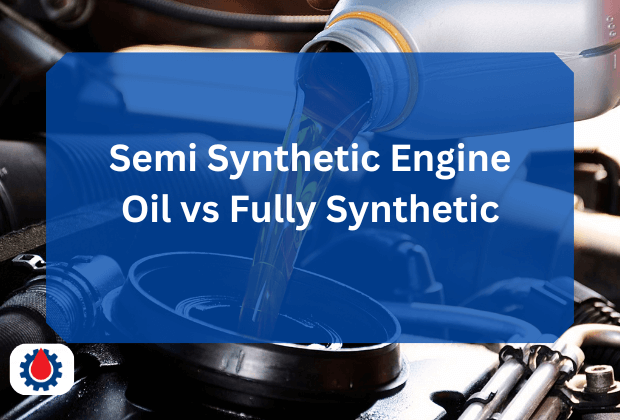Two popular options on the market are semi-synthetic and fully synthetic engine oils. Each has its own set of benefits, drawbacks, and ideal use cases.
In this post, we’ll dive into the differences between semi-synthetic and fully synthetic engine oils, exploring their composition, performance, cost, and suitability to help you make an informed decision for your vehicle.
Semi Synthetic Engine Oil vs Fully Synthetic
| Feature | Semi-Synthetic Oil | Fully Synthetic Oil |
|---|---|---|
| Composition | Blend of mineral and synthetic oils | 100% synthetic base oils |
| Cost | More affordable | More expensive |
| Performance | Good for moderate conditions | Excellent for extreme conditions |
| Oil Change Interval | 5,000-7,500 miles | 10,000-15,000 miles |
| Engine Protection | Good | Superior |
| Fuel Efficiency | Moderate improvement | Significant improvement |
Related Best Synthetic Engine Oil(Top 5 Best in 2025)
Read the detailed comparison below:
Semi-Synthetic Engine Oil: The Balanced Option
Semi-synthetic engine oil, also known as synthetic blend oil, is a hybrid of conventional mineral oil and fully synthetic oil. It combines the affordability of mineral oil with some of the advanced properties of synthetic oil, making it a middle-ground option.
Composition
Semi-synthetic oil typically contains 10-30% synthetic base oil mixed with conventional mineral oil. The synthetic component enhances performance, while the mineral oil keeps costs lower. Additives, such as detergents, anti-wear agents, and viscosity modifiers, are included to improve the oil’s overall effectiveness.
Benefits
- Cost-Effective: Semi-synthetic oil is more affordable than fully synthetic oil, making it a budget-friendly choice for drivers who want better performance than conventional oil without breaking the bank.
- Improved Performance: Compared to conventional oil, semi-synthetic oil offers better resistance to oxidation, improved low-temperature performance, and enhanced engine protection.
- Versatility: It’s suitable for a wide range of vehicles, including older models, high-mileage cars, and those used in moderate driving conditions.
Reated Dino Oil vs Synthetic Oil(Shocking Performance Differences)
Drawbacks
- Not as Robust as Fully Synthetic: While semi-synthetic oil performs better than conventional oil, it doesn’t match the durability or extreme-condition performance of fully synthetic oil.
- Shorter Oil Change Intervals: Semi-synthetic oils typically require more frequent changes (every 5,000-7,500 miles) compared to fully synthetic oils.
Ideal Use Cases
Semi-synthetic oil is a great choice for drivers with older vehicles, those who drive in moderate climates, or those looking for a balance between cost and performance. It’s also suitable for vehicles that don’t require the high-performance capabilities of fully synthetic oil.
Related Royal Purple oil vs Mobil 1(Which Oil Outperforms the Other)
Fully Synthetic Engine Oil: The Premium Choice
Fully synthetic engine oil is engineered entirely from chemical compounds, offering superior performance and protection. It’s designed to meet the demands of modern, high-performance engines and extreme driving conditions.
Composition
Fully synthetic oil is made from highly refined base oils, often derived from hydrocarbons or esters, combined with advanced additives. These oils are meticulously crafted to provide consistent performance across a wide range of temperatures and conditions.
Benefits
- Superior Performance: Fully synthetic oil offers excellent thermal stability, oxidation resistance, and low-temperature flow, ensuring optimal engine performance in extreme heat or cold.
- Longer Oil Change Intervals: Fully synthetic oils can last longer, often allowing for oil changes every 10,000-15,000 miles, depending on the manufacturer’s recommendations and driving conditions.
- Enhanced Engine Protection: The advanced formulation reduces engine wear, sludge buildup, and corrosion, extending engine life.
- Better Fuel Efficiency: Fully synthetic oils reduce friction more effectively, which can improve fuel economy.
Related Best Engine Oil Filter(Top 7 BEST 2025)
Drawbacks
- Higher Cost: Fully synthetic oil is significantly more expensive than semi-synthetic or conventional oil, which may deter budget-conscious drivers.
- Overkill for Some Vehicles: Older or low-performance vehicles may not need the advanced properties of fully synthetic oil, making it an unnecessary expense.
Ideal Use Cases
Fully synthetic oil is ideal for high-performance vehicles, turbocharged engines, or those operating in extreme conditions, such as towing, racing, or driving in very hot or cold climates. It’s also recommended for newer vehicles with advanced engine technologies that require synthetic oil to meet manufacturer specifications.
Related Best Synthetic Engine Oil for Diesel Engines(5 Best 2025)
Which Should You Choose?
The choice between semi-synthetic and fully synthetic engine oil depends on several factors, including your vehicle type, driving habits, budget, and manufacturer recommendations.
- Choose Semi-Synthetic Oil If:
- You drive an older or high-mileage vehicle that doesn’t require synthetic oil.
- You want a cost-effective option with better performance than conventional oil.
- You drive in moderate conditions and don’t need the extreme protection of fully synthetic oil.
- Choose Fully Synthetic Oil If:
- You own a high-performance or newer vehicle that requires synthetic oil (check your owner’s manual).
- You drive in extreme conditions, such as very hot or cold climates, or engage in heavy towing or racing.
- You want to maximize engine protection, fuel efficiency, and oil change intervals.
Related Hydraulic Oil vs Engine Oil(Complete Side by Side Differences)
Other Considerations
- Manufacturer Specifications: Always check your vehicle’s owner’s manual to see if the manufacturer requires a specific type of oil. Using the wrong oil could void your warranty or harm your engine.
- Driving Conditions: If you frequently drive in stop-and-go traffic, extreme temperatures, or tow heavy loads, fully synthetic oil may be worth the investment.
- Environmental Impact: Fully synthetic oils often last longer, reducing the frequency of oil changes and waste oil disposal. However, their production process may have a higher environmental footprint.
Final words
Both semi-synthetic and fully synthetic engine oils have their place in the automotive world. Semi-synthetic oil offers a cost-effective solution with solid performance for everyday driving, while fully synthetic oil provides unmatched protection and efficiency for high-performance or demanding conditions.
Keeping your engine lubricated with the right oil will ensure it runs smoothly for years to come.




